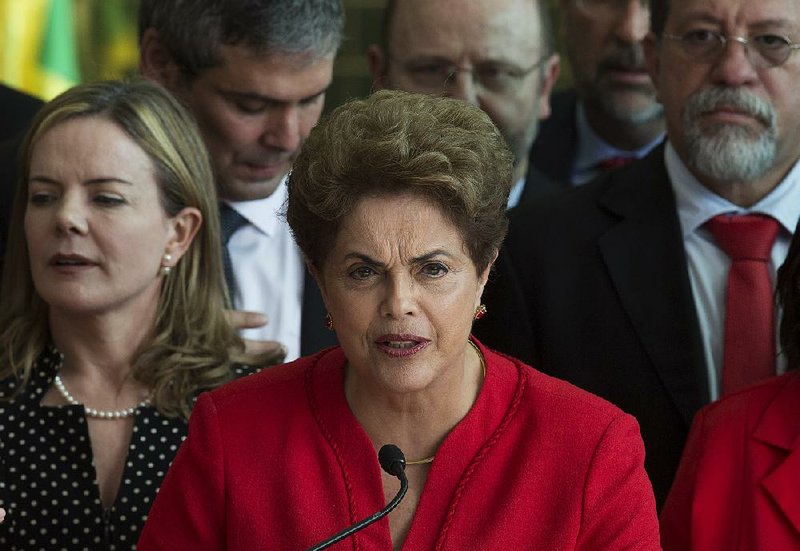BRASILIA, Brazil -- Brazil's Senate on Wednesday voted to remove President Dilma Rousseff from office, the culmination of a yearlong fight in Latin America's largest nation.
Rousseff was Brazil's first female president, with a career that includes a stint as a Marxist guerrilla jailed and tortured in the 1970s during the country's dictatorship. She was accused of breaking fiscal laws in her management of the federal budget.
"The Senate has found that the president of the federal republic of Brazil, Dilma Vana Rousseff, committed crimes in breaking fiscal laws," said Chief Justice Ricardo Lewandowski, who presided over the trial.
Opposition lawmakers, who made clear early on that the only solution was getting her out of office, argued that Rousseff's maneuvers masked deficits from high spending and ultimately exacerbated the recession in a nation that had long enjoyed darling status among emerging economies.
Rousseff proclaimed her innocence to the end. Previous presidents used similar accounting techniques, she noted, saying the push to remove her was a bloodless coup d'etat by elites fuming about the populist policies from her Workers' Party over the past 13 years.
The opposition needed 54 of the 81 senators to vote in favor of her removal. They got many more, with the Senate voting 61-20.
"Today is the day that 61 men, many of them charged and corrupt, threw 54 million Brazilian votes in the garbage," Rousseff tweeted minutes after the decision.
Rousseff won re-election in 2014, garnering more than 54 million votes.
In a second Senate vote about 30 minutes later, Rousseff won a minor victory as a measure to ban her from public office for eight years failed. The 42-36 vote fell short of the 54 votes needed for passage.
In the background of the fight was a wide-ranging investigation into billions of dollars in kickbacks at state oil company Petrobras. The two-year probe has led to the jailing of dozens of top businessmen and politicians from across the political spectrum, and it threatens many of the same lawmakers who voted to remove Rousseff.
Rousseff argued that many opponents wanted her out of the way so they could save themselves by tampering with the investigation, which Rousseff had refused to do.
Many lawmakers and Brazilians nationwide, meanwhile, blamed Rousseff for the graft even though she has never been implicated as a recipient. They argued that she had to know, as many of the alleged bribes happened while her party was in power.
Rousseff's removal creates many questions that are not easily answered. Michel Temer, her vice president, will serve out the remainder of her term through 2018. He was sworn in Wednesday afternoon.
In May, Temer took over as interim president after the Senate impeached and suspended Rousseff. Temer, a 75-year-old career politician, named a Cabinet of all white men, a decision roundly criticized in a nation that is more than 50 percent nonwhite. Three of his ministers were forced to resign within weeks of taking their jobs because of corruption allegations, which also follow Temer and threaten his hold on power.
Speaking to the nation in televised address Wednesday evening, Temer hit back at Rousseff.
"Putschist is you," he said, referring to Rousseff's accusation that he had led the charge to oust her. "It's you who is breaking the constitution."
Temer said he had tasked his Cabinet with pushing forward budget and pension overhauls as well as proposals to create jobs.
Rousseff's allies have vowed to appeal to the country's highest court. While previous petitions to the court have failed to stop the impeachment process, legal wrangling at the very least will keep the issue front and center.
Late Wednesday night, a group of Rousseff supporters smashed windows of bank branches, other businesses and a police vehicle in the city of Sao Paulo. Anti-riot police tried to quell the demonstration with stun grenades and tear gas.
The decision to remove Rousseff also leaves many question marks over the economy, which is expected to decline for a second straight year. Temer has promised to pull the country of 200 million people from its recession.
Information for this article was contributed by Mauricio Savarese and Peter Prengaman of The Associated Press.
A Section on 09/01/2016


